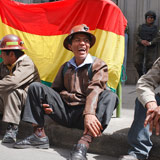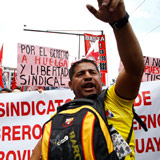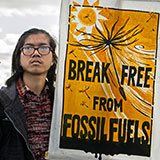
Booked: Capitalizing on Rural Resentment, with Katherine J. Cramer
Katherine J. Cramer talks about her new book, The Politics of Resentment, and how the right exploits rural-urban divides to promote a populist image.


Katherine J. Cramer talks about her new book, The Politics of Resentment, and how the right exploits rural-urban divides to promote a populist image.

The Trump administration poses a serious threat to liberal democracy, and we need to respond accordingly. Gene Sharp, the “Machiavelli of nonviolence,” offers valuable insights into how.

The outpouring of witty protest signs at recent anti-Trump protests is something new in the repertoire of social movements. But the thrilling horizontalism that the signs reflect has its limits.

While its vision of equality is still far from being fully realized, the women’s liberation movement of the 1960s and ’70s won important victories and offers vital lessons for today’s organizers.

Belabored co-host Sarah Jaffe talks about her new book, Necessary Trouble: Americans in Revolt.

As Latin America’s “pink tide” appears to ebb, Patrick Iber, Javier Buenrostro, Sujatha Fernandes, Bryan McCann, and Thea Riofrancos examine its lessons for democratic socialists in the region and abroad.

Populism is extremely limited if it is not coupled with highly organized grassroots movements with the ability to shape politics from the ground up.

Targeted use of revenue from commodities can be an immediate and necessary salve against brutal levels of poverty and inequality, but Chavismo’s “extractivist” model has left Venezuela as vulnerable as ever to the whims of the international market.

The central protagonists of Latin America’s profound shift away from the neoliberal policies of the 1980s and ‘90s were not strong leaders but social movements.

If there is any positive aspect to Brazil’s current crisis, it is the reemergence of non-partisan, civil-society mobilization in response to impeachment and its fallout.

Democratic socialism cannot emerge exclusively, or even primarily, from the grassroots—it implies the structuring of social resources in ways that require government action.

An interview with Christopher Phelps, co-author with Howard Brick of Radicals in America: The U.S. Left since the Second World War.

In the inaugural episode of Hot & Bothered, we explore the growing fight against fossil fuel extraction, with guests Bill McKibben and Tara Houska.

If Sanders does not triumph in 2016, how can those who thrilled at the prospect of a socialist president keep their movement going? One way would be to turn the Sanders platform into the agenda for a new, anti-corporate organization—a Tea Party of the left.

Social change is seldom either as incremental or predictable as insiders suggest. Instead, movements win by changing the political weather, turning demands considered unrealistic into ones that can no longer be ignored.